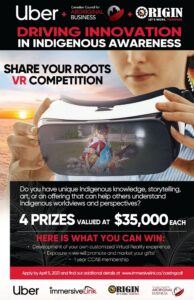ORIGIN to host Share your Roots VR Competition

By Rick Garrick
THUNDER BAY — ORIGIN is providing an opportunity for four Indigenous Knowledge Keepers, artists, storytellers or people offering Indigenous experiential tourism experiences to create a virtual reality (VR) experience through its Share Your Roots VR Competition. Launched in partnership with Uber and the Canadian Council for Aboriginal Business, the competition has an entry deadline of April 5. Information about the competition is posted online.
“We’re getting a great response and we’re pretty excited with some of the applicants so far,” says Melissa Hardy-Giles, owner at ORIGIN. “It’s pretty exciting and we have [applicants from] right across Canada.”
Hardy-Giles says the idea behind the competition is to inspire Indigenous knowledge keepers, storytellers and artists to share their gifts.
“Our nations are so diverse,” Hardy-Giles says. “We want to be able to highlight nations from across this land and demonstrate to Canadians the resilient, vibrant and beautiful cultural experiences that Indigenous people bring to the fabric of our society.”
Hardy-Giles says the successful applicants will begin their VR experience creation process with a storyboarding session.
“Then we go to the film site with our film crew and we get footage,” Hardy-Giles says. “And then we will be doing some editing. We work together with the people that are in the video to make sure everyone agrees on what is going out, and then it is launched into our (ImmersiveLink) library.”
ORIGIN originally launched the ImmersiveLink comprehensive virtual reality-based platform in 2018 for career exploration, development and training as well as for Indigenous cultural awareness and diversity purposes.
“We originally developed the tool to enable Indigenous job seekers to see the opportunities that might not be available in their communities,” Hardy-Giles says. “I want our people to be able to dream and be connected to careers that fit their own natural gifts and abilities.”
Hardy-Giles says the ImmersiveLink library is currently being used by about 1,100 schools across the country.
“The word is getting out, so we’re working with more and more industry partners to get more footage and more experiences for our library,” Hardy-Giles says. “Everyone is wowed when they see it. We’re getting people right across Canada contacting us wanting to portray either their Indigenous knowledge or with industries contacting us to be a part of our career library. So we’re working as a bridge between industry and First Nation communities.”
Hardy-Giles says the ImmersiveLink technology enables people to be “fully immersed” in the VR experience they are viewing.
“One of our experiences is a Full-Moon Ceremony that takes place in a teepee, so it’s basically like you’re sitting right in there,” Hardy-Giles says. “You can look all around you, you can look behind you, you can look on the floor or up above and it’s just like you’re sitting right in there. It’s like you’re totally immersed into the experience.”
Hardy-Giles says the full moon ceremony VR experience begins with the knowledge keeper talking about how they prepare for the ceremony.
“She walks in the forest and collects cedar and explains all the preps she goes through in order to [do] the Full-Moon Ceremony,” Hardy-Giles says, noting that they do not show the actual ceremony. “The camera comes back to show how they end the ceremony and the importance of it.”
Hardy-Giles says her goal is to introduce the ImmersiveLink technology to other Indigenous communities around the world.
“My goal actually is to go global and also cover other Indigenous cultures as well,” Hardy-Giles says.


